University of Suffolk NEWS
WELCOME
The launch of our ten year Strategy and Vision 2020-2030 moves forward the work we had already undertaken over the last five years since achieving university status. Whilst building on the good work we have already achieved in learning and teaching, research and scholarly activity, business engagement and the strength we continue to have around widening access and participation in our region, we know we have more to do.
This edition recognises many of the projects and developments underway. As we look towards future growth, it is encouraging and exciting that we continue to ensure we are a major transformational force for good in our community and beyond. The ten year strategy identifies the nature of the culture we aspire to and sets out our values which we want to define us and provide a framework to help us deliver on our vision and mission.
As many of you know this academic year, I have chosen to focus on enhancing our equality, diversity and inclusion. We state that we want to be seen as a connected community, where staff and students espouse the values of inclusion, tolerance and innovation. We also state that this community should be built on respect, fairness and compassion. We want to debate our differences sensitively and celebrate the strength and creativity that a diverse community gives us.
These values were shaped by staff and students collectively and have strength because of this. However, they remain easy to say but much more challenging to ensure that this is the lived experience for us all.
Issue 10 - Spring 2021
I have been pleased to see many colleagues and students engage in the ‘Listen Up’ sessions around Black Lives Matter and disability, and to witness volunteers championing some of our forums and groups such as LGBTQIA+ and anti‑racism. However, there is more to do.
Developing an inclusive workplace means that we have a work environment that makes every employee and student feel valued, while also acknowledging their differences and how these differences contribute to the University of Suffolk culture and business outcomes.
Listening has enabled us to begin to uncover aspects of our culture where we need to do better and where we need to see the development of an inclusive workplace as everyone’s business not just the business of the leadership or those who feel particularly concerned or wish to champion inclusivity. So, what can we do? Alongside the refreshing of our forums we are revamping our Equality, Diversity and Inclusion Committee and in particular, identifying key areas where we can take action and make a difference. These include recruitment and talent management, induction
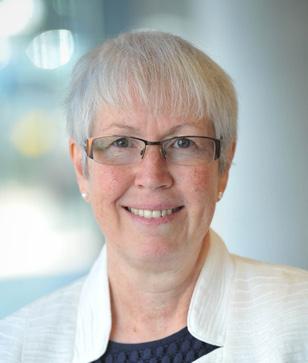
University of Suffolk NEWS Issue 10 Spring 2020 Page 1
continued
page
on next
and ongoing staff development, our approach to learning and teaching in the decolonisation of the curriculum, promoting anonymous marking and the extent of the use of English as an assessment criteria in different subject areas. We have also set challenging targets in our Access and Participation Plan that we will strive to achieve.
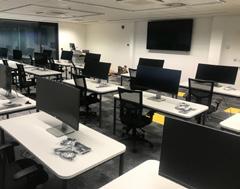
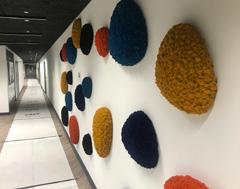

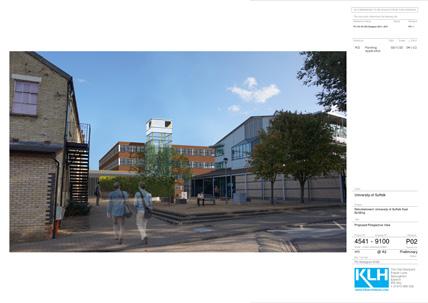
Following the REF 2021 submission I will be setting up a group to consider, plan and successfully take the University through Athena Swan accreditation. All of these initiatives require us to analyse and make use of the people data available to us and that we have to report externally. This data is already telling us that we have some gaps in our approaches to equality, diversity and inclusion that are not acceptable.
As a University committed to our values we are mindful that we need to do further work to develop our culture of inclusivity and diversity in the broadest terms and make a difference not only to those of us already part of this community but also to make the University of Suffolk a place where people want to work because of our reputation around being inclusive and embracing diversity.
There is much to do, and it starts with us individually and collectively. Do not just watch this space, enter the space, recognise the need and embrace the challenge.



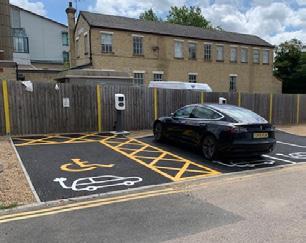
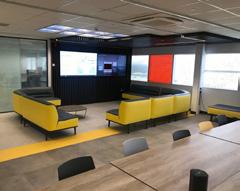 Professor Helen Langton Vice‑Chancellor and CEO
Professor Helen Langton Vice‑Chancellor and CEO
Issue 10 Spring 2021 University of Suffolk NEWS Page 2 Welcome continued
WELCOME
Contents
Welcome 1
In focus 4
The Integrated Care Academy: a unique partnership 4
Review of the Macmillan Cancer Care Navigator (MCCN) service 5
In-Career Education and Training (ICET Project) 5
News and updates 6
Transforming Lives and our Region — Strategy and Vision 2020–2030 6
Suffolk Business School announces new partnership 7 University of Suffolk Leadership Academy 7
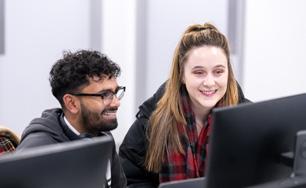

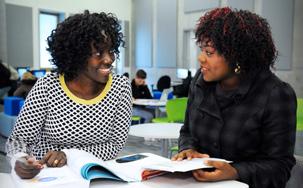

Ichi-go Iche-E: A heart that values encounters with people 8
LGBTQIA+ History Month 2021 10 Student Blogging Team 10
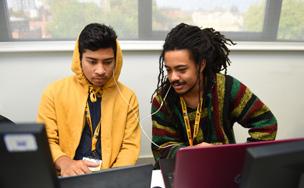
East Building project update 11
Meet and greet 12
Interview with Nigel Lucker, Director of Estates 12 Georgia Downs Student Experience and Engagement Officer 13
Sustainability 13 Meeting the Climate Challenge 13
DigiTech Centre 15
Update by Will Pryke, DigiTech Project Manager 15
Student and graduate Successes 16
PhD student sees work published in Nature 16 History graduate receives RAF Museum Academic Award 17

Dissertation project leads to training of therapy dog 18 University of Suffolk alumni celebrate success 18
News from the Talking Shop 19
Research and publications 20
Collaborative Honour Abuse Research project report 20 Domestic abuse conference series 20
Launching an Integrated Care Academy - latest news 21
Over to you 21
TRANSFORMING LIVES AND OUR REGION
University of Suffolk NEWS Issue 10 Spring 2020 Page 3
Our strategy and vision 2020–2030
IN FOCUS
The
Integrated Care
Academy: a unique partnership
The Integrated Care Academy (ICA), the newest University of Suffolk venture, is a bold ambition to create excellence in integrated care. The ICA is an exciting and unique alliance between the University of Suffolk, NHS Integrated Care System and Suffolk County Council capitalising on collaborative capacity to reduce health inequalities.
The aim of the ICA is to provide best possible coordinated care responsive to the needs of local communities. This commitment to improving health and social care is backed by the alignment of its three priority areas recognised by the Suffolk and North East Essex Integrated Care System (ICS):
Mental health and emotional well being.
The best quality of life as we grow older.
The care and support we need towards the end of life.
Guided by the three priority areas, the ICA’s five core programmes will tackle health inequalities from a whole system approach:
Education, training and development – to develop further capacity, competence and capabilities in integrated care.

Workforce – to engage and develop people, both employed and voluntary, to strengthen integrated care.
Leadership – to develop local leaders and talent to enhance existing and potential initiatives in integrated care including creating an environment where we encourage a cultural approach in which leadership will thrive.
Technology and innovation – to support and be a catalyst for integrated care, adopting, adapting and creating new tech initiatives.
Research and evidence – to promote cutting edge integrated care that will best support our communities.
The ICA and its programmes, were the product of co production; engaging over 100 key stakeholders including policy makers, organisations, charities, volunteers and residents in meetings, surveys, interviews and stakeholder events. The ICA is committed to continuing a culture of co production. Citizens and service users, including seldom heard groups, will participate in ICA activities from design through to evaluation ensuring the ICA is aware of, and addressing, the needs and challenges of the communities it serves.
In this sense, the ICA shares a determination with its community partners including Health Watch Suffolk, Suffolk Mind, Suffolk Office of Data Analytics, and the St Elizabeth Hospice to create a world class educational and research environment to deliver the skills needed to keep people healthy and independent for as long as possible.
“The Integrated Care Academy will enhance quality of care, quality of life and health equality through core programmes that embrace co-production to maximise local impact, whilst aspiring to become an exemplar in person-centred integrated care nationally and internationally.”
Our first commitment is to make a difference for local people. Our aspiration is to become an exemplar in the field of integrated care by extending our local impact, regionally, nationally and internationally. As the only Integrated Care Academy in the UK, this provides an opportunity to demonstrate how Suffolk and North East Essex can become one of the best places in the world for learning, developing and implementing integrated care.
The launch of the ICA is planned for the week of 24 May 2021 - see the last page of this Newsletter for more information.
Issue 10 Spring 2021 University of Suffolk NEWS Page 4
IN FOCUS
Review of the Macmillan Cancer Care Navigator (MCCN) service
Organisations and cancer charities are constantly trying to improve the cancer pathway by developing innovative services to support patients. In the West Suffolk Alliance, a new service has been developed in collaboration with Macmillan Cancer Support and has been operational for over twelve months. This new service consists of a team of cancer care navigators who work across the acute and primary care services providing one to one support to cancer patients around their non medical needs such as money worries or feelings of anxiety.
Dr Noreen Cushen Brewster and Dr Jane Black in the School of Health and Sports Science have secured funding and worked in collaboration with the West Suffolk Alliance and Macmillan to review the effectiveness of the service.
A mixed method of qualitative and quantitative approaches was used to collect the data, this included analysis of existing data sets used to collect demographics and referral patterns about the service. Semi structured interviews
and a focus group were conducted to collect qualitative data from the Macmillan Cancer Care Navigators (MCCN team), members of the Steering committee and stakeholders.
This review has demonstrated how the MCCN service has helped improve the cancer pathway for almost six hundred patients from October 2019 to October 2020. It shows that most elements of their service were used and psychological support was accessed most by patients and endorsed by the clinical nurse specialists. Patients with a breast cancer diagnosis used the service the most with very low uptake from other cancer sites such as urology and colorectal. Having ‘drop in’ clinics and the MCCN attending multidisciplinary team meetings in GP practices improves the integration between primary and secondary care.
Noreen and Jane will be completing a phase two review within the next six months which will include exploration of the experiences of patients who have used the service.
In‑Career Education and Training (ICET Project)
The University is pleased to announce that the European Social Fund has contributed to a project that will provide support for small and medium sized businesses (SMEs) to access high quality CPD. The total project value of just under £1million will make a huge difference within the region and focus on two identified regional skills gaps, professional leadership and management, and digital innovation.
SME’s can access up to 50% funding for the training they need to develop and grow sustainably. ICET sits alongside the DigiTech Centre and Suffolk Business Schools Leadership
Academy with the collective aim of equipping SMEs to overcome challenges, recover from COVID-19 and crucially, encourage the progression of women in business and digital environments.
ICET Project Manager, Debra Gingell said, “This is a great outcome for the University of Suffolk and local SMEs and I’m excited to support emerging woman leaders in the region”.
EUROPEAN UNION
European Social Fund
University of Suffolk NEWS Issue 10 Spring 2020 Page 5
NEWS AND UPDATES
Transforming Lives and our Region —
Strategy and Vision 2020–2030
Following the considerable work that went into developing the University’s Strategy and Vision 2020–2030 much has been done to share the plans and direction across the region. As a significant local employer with a commitment to partnerships and collaborative working, the Vice Chancellor and Deputy Vice‑Chancellor were keen to share their vision with a series of presentations to key partners, organisations and colleagues in recent months.
Following the challenges and uncertainties of the last year the presentations were warmly received by private and public sector leaders and representatives.
The groups represented included: Suffolk County Council (SCC) Public Sector Meeting; SCC Chief Executive’s meeting; SCC Joint Leadership Team; and the Local Enterprise
Partnership (LEP). Suffolk Chamber of Commerce also hosted an exclusive business leaders round table event for the University.
Recognising the importance of the staff community in the context of current achievements and the vision for the future, the senior team also delivered three live, online presentations to staff followed by an open question and answer session creating an opportunity for colleagues to explore in more detail areas of particular interest to them.
Take a look at Transforming Lives and Our Region — Strategy and Vision 2020–2030
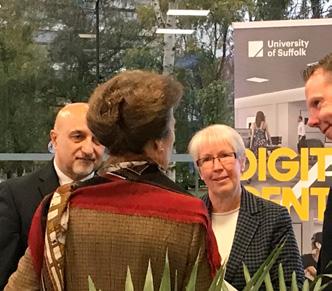
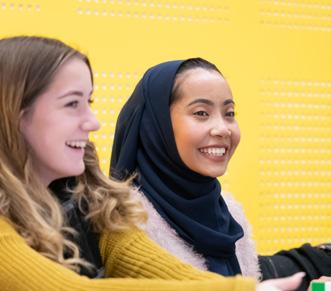
Read the recent news update about the University in the East Anglian Daily Times

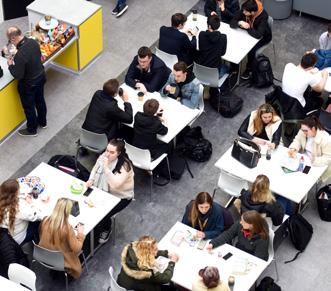
People and Places Research and Scholarly Activity
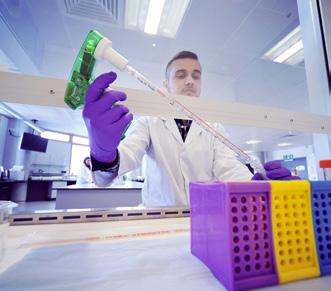
Issue 10 Spring 2021 University of Suffolk NEWS Page 6 Business Engagement International
Learning and Teaching and Assessment
TRANSFORMING LIVES AND OUR REGION Our strategy and vision 2020–2030
Suffolk Business School announces new partnership
Suffolk Business School is proud to announce a new partnership with the Chartered Institute of Management Accountants (CIMA). As the world’s largest body of management accountants this partnership is a great opportunity for future accounting and finance professionals to develop their skills and enhance their career prospects.
Through this partnership, students for the BA (Hons) Accounting and Financial Management degree will be automatically registered as CIMA students with access to their extensive range of learning and employability resources and the opportunity to study CIMA accredited accounting qualifications. Students will also get fast tracked towards earning the Chartered Global Management Accountant (CGMA) designation, the most widely held management accounting designation in the world. They will also get the chance to become both a member of CIMA and the Association of International Certified Professional Accountants opening doors to a vast range of careers in finance and business, across private, public and not for profit sectors for organisations around the world.
Professor Gurpreet Jagpal, Pro Vice Chancellor for Business and Entrepreneurship at Suffolk Business School, said, “The partnership with CIMA further strengthens Suffolk Business School’s links with professional bodies and external businesses. Our students will benefit from a partnership enhancing their knowledge and skills, adapting to an ever changing world of work. Developing and growing this partnership over the next few years will benefit staff, students and the sector.”
This partnership is part of Professor Jagpal’s five‑year strategic plan to build stronger and deeper links with business and professional bodies, and Paul Turner, Regional Vice President – UK and Ireland at CIMA, added, “This partnership reflects our ongoing commitment to support young people into the profession, helping them build their dream careers and develop skills and competencies that are in high demand by employers enabling them to thrive in the modern business world.”
University of Suffolk Leadership Academy
We’re excited about the launch of the University of Suffolk Leadership Academy, the home of executive education and short courses focusing on sustainable, responsible leadership and management.
The Academy will start with new provision from the Institute of Leadership and Management (ILM) — offering their Level 3 and Level 5 Certificates in Leadership and Management — alongside a programme of workshops and short courses. In time, this provision will expand to become a wider offer including bespoke training opportunities and knowledge transfer activity.
This is something that we hope you will be excited to support.
You will start to see the first pieces of Leadership Academy activity over the next couple of months with some workshops and then progressing to welcome the first cohort of students onto the Institute of Leadership and Management Level 3 Certificate. As you see these opportunities please share them with your networks and encourage colleagues to participate and attend.
University of Suffolk NEWS Issue 10 Spring 2020 Page 7
NEWS AND UPDATES
Ichi‑go Iche‑E:
A heart that values encounters with people
Annie Barker, School of Health and Sports Science
The Japanese idiom Ichi go Iche E, meaning ‘a heart that values encounters with people’ lay at the centre of this year’s exchange programme for nursing students with Keio University, the prestigious and leading research institute in Tokyo.
The virtual programme aimed to overcome the isolation threatened by COVID-19, to continue to bring together students from Japan, China, Korea and the UK to connect beyond country, time, distance and language, for a full and frank exchange of ideas about healthcare around the world.
Seven members of the School of Health and Sports Science were honoured to attend the virtual student exchange programme from the 1–5 February, organised by the programme co ordinator Associate Professor Rika Fujiya. The University of Suffolk was represented by lecturers Karen Hayward, Dr Liz Williams and Annie Barker, and students Francis Miller, Isabella Mahlangu, Lauren Missenden and Rebecca Smith.
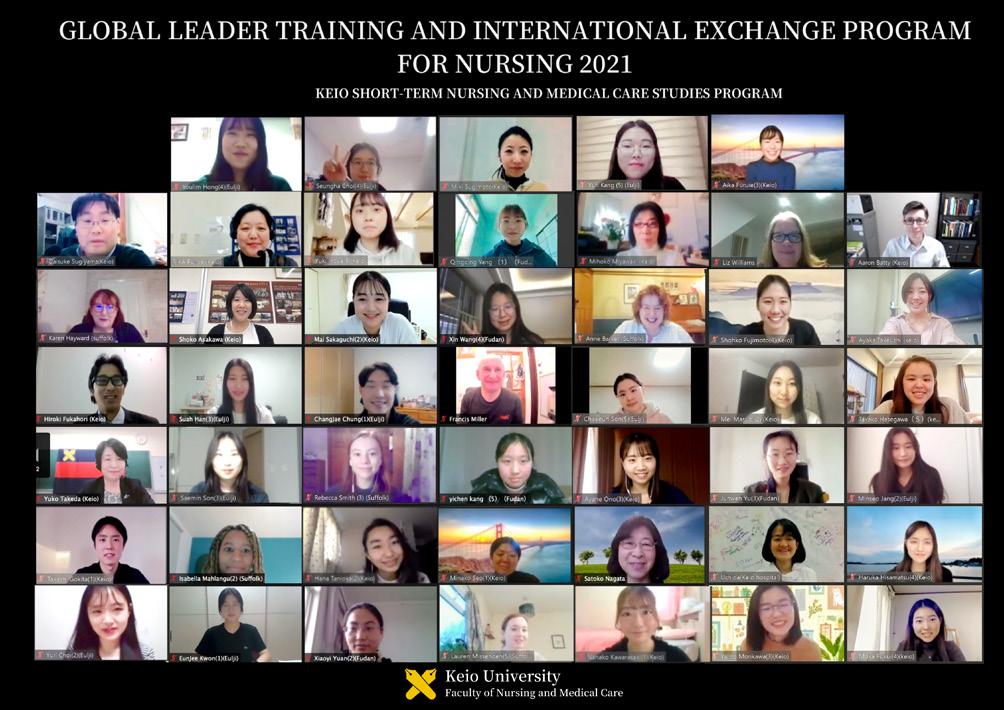
Issue 10 Spring 2021 University of Suffolk NEWS Page 8 NEWS
UPDATES
AND
The exchange programme is one of the gems in the University calendar. This year our early morning schedule, in the dark due to the differences between time zones, made the rendezvous feel exciting, mysterious and clandestine. Each day we were treated to fascinating materials on the structure of nursing in Japan and the intricacies of their health insurance system, plus virtual tours of the Keio campus, the acute health sector and the work of one of the city’s home nursing stations, Cosmos. The materials led to some fruitful discussions amongst faculty.
The latter whetted the appetite of District Nurse and BSc Adult Nursing Course Lead Annie Barker, who was fascinated by the micro level of integration between health and social care in Japan and the very compact forms of accommodation in which the citizens lived.
The international students collaborated to provide the most visually appealing and informative presentations on the similarities and differences in the healthcare systems between countries.
Mature student Francis Miller commented: “... it was a pleasure to communicate with such lovely young people from Japan, Korea and China. I learned so much from these students. Chatting with them and learning about the health care of their elderly made me realise that the common language of nursing, the language of kindness, shines through international boundaries.”
Isabella Mahlangu further summed up the experience from the student perspective: “For me, the programme was a success. I enjoyed the experience and learned so much in terms of what other student nurses are doing in different parts of the world. Communication was challenging, but with patience you would get the information. In hindsight, I think this was preparing me for my nursing practice, as communication can be challenging with other service users due to language barriers”.
The programme closed with a moving and ceremonial address by the Dean of Keio’s School of Nursing, Professor Yuko Takeda on the success of the programme and the importance of our continued alliance.
We hope to welcome the Japanese contingent, in person, back to our shores soon.
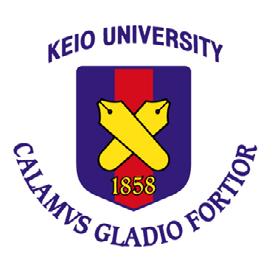
University of Suffolk NEWS Issue 10 Spring 2020 Page 9
UPDATES
NEWS AND
LGBTQIA+ History Month 2021
Undeterred by lockdown the LGBTQIA+ Staff Network and LGBTQIA+ Society found much to celebrate and share in February. They jointly organised a number of events to build the community between University staff and students and more widely across Suffolk including the LGBTQIA+ Unconference. Designed to break down the conventional conference structure they created a place to explore in groups: combatting homophobia in academia, intersectionality, LGBTQIA+ representation in science, language, heteronormativity in higher education, pride parades, power structures, and developing inclusive environments.
Earlier in the month, March for Dignity was streamed via zoom. The documentary screening, about a small group of activists in Tbilisi, Georgia
Student Blogging Team
The Marketing and Communications team welcomed Max, Richard and Lily as new Student Bloggers this month, as well as Maya, the new Digital Ambassador.
They will join our current blogger, Rose and will work closely with Natasha Sones, Web and Digital Content Officer.
Maya will be supporting with marketing projects including social media, website editing, photography, filming and events as well as blogging.


attempting to establish the country’s first Pride march, was followed by a panel discussion including the films director, John Eames and Tbilisi Pride co founder Mariami Kvaratskhelia. Watch the discussion on YouTube
Dr Sebastian Cordoba, lecturer in Psychology and Darragh Briscomb, LGBTQIA+ Officer for the Students’ Union interviewed the author of Sexuality: A Graphic Guide by Dr Meg John Barker via Zoom. The discussion explored Meg John’s creative process, the importance of expanding our understanding of sexuality, sex education, and the benefits of challenging the ghosts/monsters of the past that limit our understanding of sex and sexuality. The event included an audience Q+A and you can watch their discussion on YouTube.
Natasha said, “They are a very diverse team from a variety of courses and with lots of different experience. They have already inspired us with some fab content ideas and we are excited to see what the blogging team come up with!”
To read the blog go to Life at Suffolk Blog Contributors and if you have a story to share contact Natasha at n.sones@uos.ac.uk


Max Richard Lily Maya
Issue 10 Spring 2021 University of Suffolk NEWS Page 10
NEWS AND UPDATES
EAST BUILDING PROJECT UPDATE
The East Building Project, designed to accommodate new specialist teaching and clinical skills areas bringing together current and new provision to create a Health and Wellbeing ‘quarter’ is moving forward despite the pandemic.
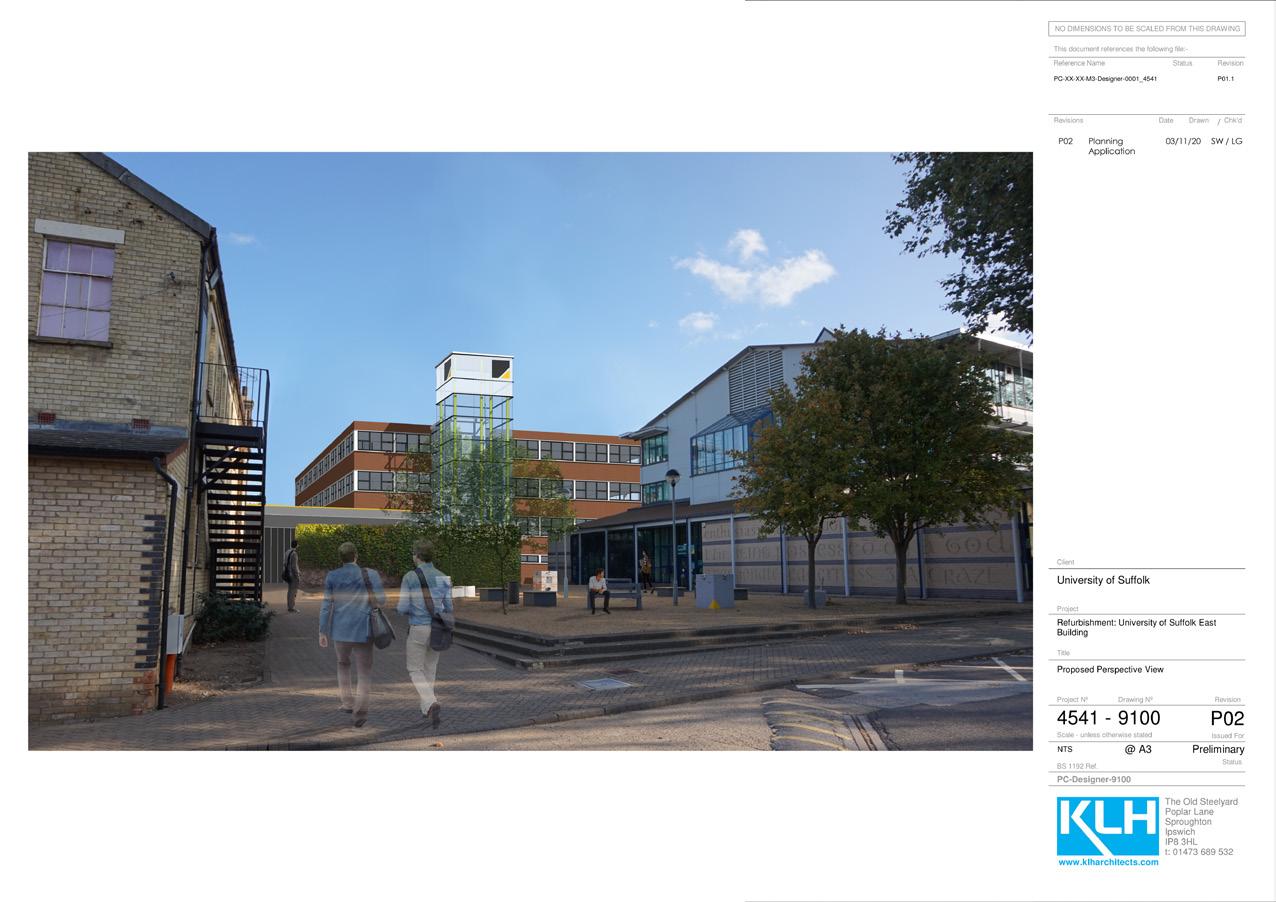
The progress on Phase One indicates that the Phase Two refurbishment works can commence without delay and this is a key element for project delivery as Phase Two will see the design and refurbishment come to life. The tender returns were evaluated in early March and the Phase Two works were awarded so we can now begin to start work.
Nigel Lucker, Director of Estates and project lead, said, “This renovation offers opportunity for the University. It’s an opportunity to step back, learn and have a play with the spaces we have got including the East Building, and how we can endorse that for future spaces. It allows us to think about what we want from the spaces we occupy and how we return to a different way of working. We are looking at more collaboration space and creating the best possible learning experience, making sure we empower those using the building to do so in a more flexible way.”
We will keep you updated with progress in the next newsletter.
University of Suffolk NEWS Issue 10 Spring 2020 Page 11
Interview
with Nigel Lucker, Director of Estates
Tell us about your background.
I have always worked in estates and facilities, mostly in the public sector, including the British Transport Police. More recently work with the foreign and commonwealth office took me abroad, including 10 years in Singapore looking after embassies, high commissions and diplomatic residencies across Asia, Russia, India and Europe. I enjoy working in the public sector, it is where I feel I can give most value. With the British Transport Police I looked after logistics and I was there during the tragic London bombings in 2005, I was awarded a Police commendation for my work and got to meet the Queen and it was one of my proudest moments.
Why Suffolk?
I have been in Suffolk for 18 months, my wife’s parents moved here 20 years ago and we visited often and fell in love with the place. I have really embraced Suffolk life, becoming a parish councillor, leading a group of volunteers supporting the local community during the pandemic and volunteering on the Football Association disciplinary committee. The location also offers lots of diversity and opportunity especially around the University, combining town life with rural surroundings.
Why did you choose the University of Suffolk?
I think this is an exciting time to join the University, it is still young and maturing which is a great opportunity and a good time to be leading on a longer term Estates strategy. David Green who was here before me certainly looked after things and I am taking over a well maintained ship. I want to see if we can refine our processes to make them less paper heavy and more efficient, giving ourselves some time back but keeping a customer centric service with a human touch. I really want to focus on the team, making sure we have the numbers to allow the strategy to take hold in the next 10 years with the right people doing the right jobs and seizing opportunities and adding efficiencies to try and find that 1% in everything we do.
What will be your focus?
The renovation of the East Building is a good example of a well timed opportunity as we should be past the pandemic when the works are completed. As the situation moves on, we want to step back to see what we have learned and review what we need from our campus and spaces to work. It is an opportunity to look at flexibility and collaboration, to remain a jewel in the crown of Ipswich and Suffolk we want to work alongside partners and the local authority to ensure our estates continue to add value to the region.
The quick-fire round:
Tea or coffee? Definitely coffee
Cat or dog?
Both – I have a puppy named Huxley, and two cats called Darcy and Dakota
Football or rugby?
Both – I am a proud season ticket holder at West Ham Utd but also love rugby, particularly internationals
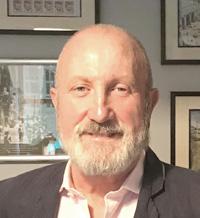
Summer or winter?
Winter – I love winter and used to ski a lot, when I first started out in retail, I sold ski equipment
Sweet or savoury? Sweet
Instagram or Twitter? Twitter
Boxset or cinema? Cinema
Staycation or vacation?
Vacation
Cake or biscuit? Biscuit
Soap or sitcom? Sitcom
Describe yourself in three words: Passionate, enthusiastic, fun
Issue 10 Spring 2021 University of Suffolk NEWS Page 12
MEET AND GREET
Georgia Downs Student Experience and Engagement Officer
After completing her degree in Psychology and Early Childhood studies, Georgia Downs applied, campaigned and secured the role of President in the Students’ Union 2018 elections, and was re‑elected in 2019.
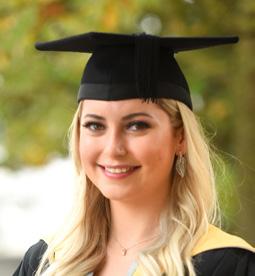
We asked Georgia to sum up her experience and tell us what she is doing now.
“It was the most amazing two years; canvassing for students on a local and national scale, working on a variety of projects in partnership with the University and importantly, ensuring the student voice was part of every decision. My experience in office brought significant challenge, opportunity and growth.
“As my presidency came to an end, it was safe to say I had found a passion for my work and I am now the Student Experience and Engagement Officer at the University of Suffolk and have the pleasure of working with a team
of seven like‑minded Student Experience Ambassadors that all share my enthusiasm. Collectively, we are championing the University’s appetite to deliver an excellent student experience.
“We have established a presence on Brightspace which students are actively using to engage with the team, book one to one appointments, discover how feedback has been acted on/responded to and find out about key information to name a few. Students and staff are already noticing the positive impact that the team are having on student experience. The more recognised the Student Experience Team becomes within our community, I know our impact will only grow.”
SUSTAINABILITY
Meeting the Climate Challenge
Justine Oake s, Sustainability Manager
In July 2020, the University of Suffolk Sustainability Policy was re launched with the ambitious goal to transform all University operations and campus management activities; modelling sustainability across all aspects of campus life, transforming it into a living lab for a sustainable future.
The pandemic has presented a sobering reminder of how resilient and effective our community can be when responding to threats beyond our control and the importance of managing the mitigation of risk.
Extending our approach to resilience, we are focused on “building back better”, by continuing to further eliminate and reduce our impacts on the interconnected challenges of climate change, resource consumption and the silent crisis of biodiversity loss.
We have a solid foundation to build upon, having significantly outperformed our 43% carbon reduction HEFCE KPI for 2010 to 2020; achieving a reduction of approximately 57%.
University of Suffolk NEWS Issue 10 Spring 2020 Page 13
MEET AND GREET
SUSTAINABILITY

Systematic building performance improvement has formed the cornerstone to this achievement, with improved efficiencies through LED lighting, roof and argon filled window replacements, heating upgrades and building insulation. Realising reduced carbon consumption and financial benefits, the installation of two solar panel arrays on the Atrium and Library buildings, now provide a combined 54.26kWp potential of renewable energy.
Getting to grips with our water infrastructure and waste production are additional priority areas.
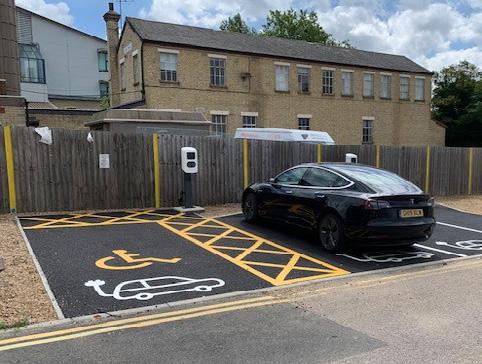
Having achieved our 90% waste recycling target, we must now turn our attention to University wide consumption and procurement practices to identify areas for improved resource efficiencies. As we grow the estate and its supporting IT infrastructure, our new Carbon Climate Plan, will be instrumental in ensuring that decarbonisation remains at the heart of our activities, with an ambition to move towards net zero over the coming decades.
Looking to the future, the recently completed installation of The Hold innovative battery storage facility in partnership with Suffolk County Council, will provide advanced solar and grid storage technology using recycled Renault van batteries. Further research innovations for low carbon futures are also underway at the DigiTech Centre at Adastal Park, delivering an exciting demonstrator testing space for low energy and live building monitoring technologies.
Through our University Travel Plan we are also rolling out infrastructure and initiatives to encourage sustainable transport choices for everybody; seeking to reduce the negative impacts of travel such as carbon emissions, congestion and air pollution. Electric vehicle charging forms an important part of this strategy as we support technological changes, modal shifts and the evolving travel requirements of the University population. Funded through Capital Growth and OLEV, we are set to commission the four EV charging units located on the University car park, one of which is allocated to disabled drivers. Data capture software will enable us to monitor usage and further units are planned once University up take approaches capacity. This project has been greatly supported through the engagement of third year Intern student, Michael Wood. As a sometimes seemingly disruptive future approaches we will continue to strategically build on our successes, extending our academic and estates sustainability portfolio. Not as an adjunct to our operational activities, but as one of our core areas of distinctiveness shaping our University’s vision. For more information on this and other Sustainability projects please contact the Sustainability Manager: justine.oakes@uos.ac.uk
Issue 10 Spring 2021 University of Suffolk NEWS Page 14
continued
Sustainability
DIGITECH CENTRE
Update by Will Pryke, DigiTech Project Manager
As a world class centre for innovation in technology and media, Adastral Park is the perfect setting for the DigiTech Centre as it is home to BT’s Applied Innovation Labs and an exciting cluster of over 120 other high tech digital and technology companies.
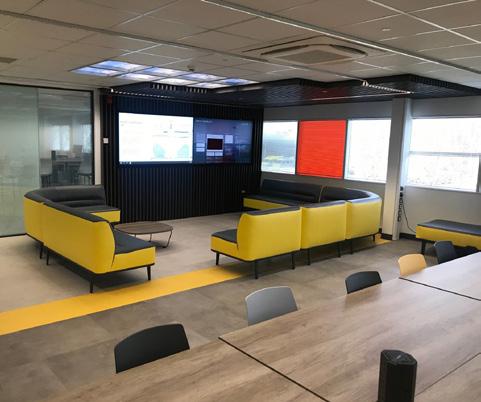

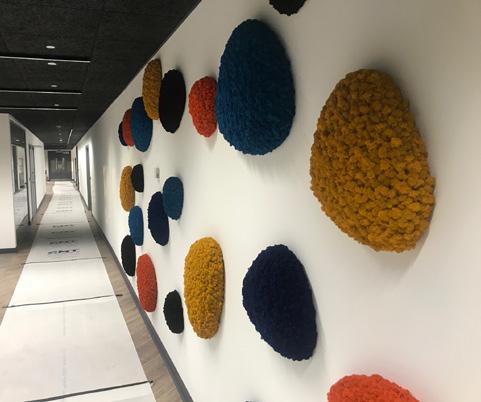
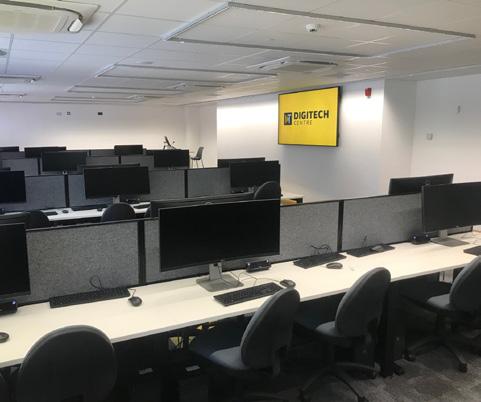
So why do we need a DigiTech Centre? Simply, all industries are becoming more “digital”. Data is at the heart of the digital transformation and this is especially true of sectors where traditionally less data was collected. The criticality of data within businesses is growing exponentially and this is driving the need for a fundamental digital upskilling of the regional and UK wide workforce.
Jim Marshall, DigiTech Centre, Strategic Board Advisor and founder of Marshall Wolfe a Suffolk based Hiring Consultancy, gives his perspective: “There is fierce competition for digital expertise nationally. Companies and regions are often focused on how to attract the highly skilled with precious little time and effort in creating genuine opportunity for upskilling local talent. For me the DigiTech centre proves we, as a region, can deliver a business and education collaboration that is super relevant and will benefit local people and local companies.”
Follow the DigiTech blog
Watch the video and find out more
University of Suffolk NEWS Issue 10 Spring 2020 Page 15
STUDENT AND GRADUATE SUCCESSES
PhD student sees work published in Nature
PhD student, Penny Fenton, has recently had her images and footage of tardigrades, known as water bears, published by the world’s leading multidisciplinary science journal, Nature.
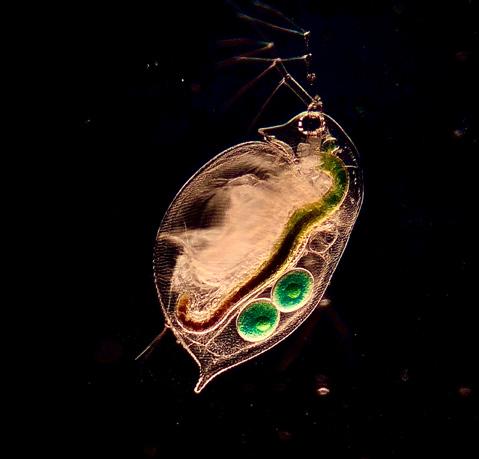
“My interest in microorganism recording was sparked during a practical in microbiology at the University during my undergrad studies. I invested in my own research microscope and started looking at any water I could lay my hands on in my spare time. When I discovered a community of people sharing recordings and communicating information about these tiny beasties, water bears or tardigrades, on Instagram, I started to do the same.”
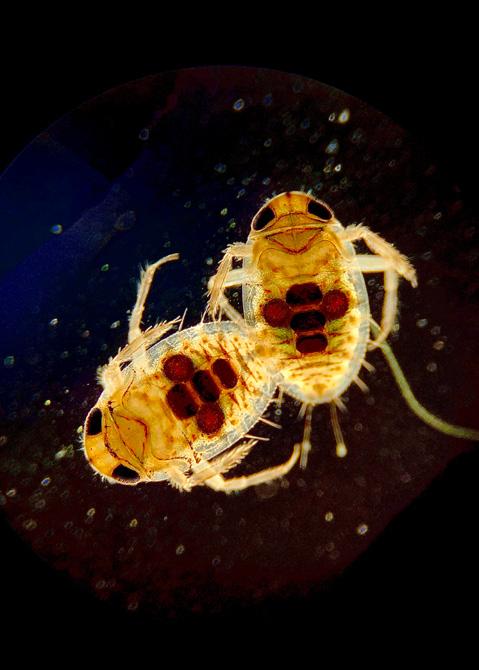
“I now culture algae at home, including the Volvox which is shown in the Nature video, and collect tardigrades from various sources to breed and add to other organisms. I often co‑culture organisms or introduce them for short periods to see how they behave. That’s what was going on in the video. The Milnesium sp. Tardigrade was trying to find something to grab onto and the Volvox happened to be the only thing around.”

Issue 10 Spring 2021 University of Suffolk NEWS Page 16
Photos by Penny Fenton
STUDENT AND GRADUATE SUCCESSES
History graduate receives RAF Museum Academic Award
Nick Black, a BA (Hons) History graduate has received the Royal Air Force (RAF) Museums Award given to final year students.
Nick Black, an armed forces veteran and former police officer was given the Award for his dissertation entitled, ‘Revisiting the Battle of Barking Creek, 6 September 1939’.
The Awards are given on the recommendation of a selection panel of RAF Museum Research Board members and the bursary and prizes are for writing in the field of ‘air power studies’.

Dr John Greenacre, Lecturer in History at the University and Nick’s dissertation supervisor, said, “Nick put a great deal of hard work into his dissertation. His meticulous research and analysis have resulted in the definitive account of this little known but often disputed incident during the Second World War.”
The focus for his research was an RAF fighter pilot mistaken for an enemy aircraft, shot down and crash landing just outside Ipswich three days after Britain went to war with Germany in 1939. The subject will be presented at an RAF Museum later this year and a piece submitted for publication by the British Commission for Military History Journal.
The essay was praised by the Museum Research Board for being ‘thoroughly researched and presenting exciting new evidence’ and for Nick, receiving recognition for his work from such a prestigious organisation ‘made the whole three year adventure of studying for my degree even more worthwhile’.
To find out more:
RAF Museum Awards
Studying BA (Hons) History at the University of Suffolk
University of Suffolk NEWS Issue 10 Spring 2020 Page 17
Photo: Royal Airforce Museum
STUDENT AND GRADUATE SUCCESSES
Dissertation project leads to training of therapy dog
Colleen Brooks, of the 0219 Adult Nurse Degree Apprenticeship cohort, last year embarked on the dissertation module and explored the impact of pets as therapy in the hospital setting. Colleen not only achieved highly in her dissertation, but shared with us some exciting news. Zalu, her German shepherd puppy has

also been studying hard alongside Colleen to become a Pets as Therapy dog. Whilst the pandemic has delayed his progress slightly, he will soon be able to qualify with his gold award and start making a difference in the local Trust.

Congratulations to Colleen and Zalu. What a team!
University of Suffolk alumni celebrate success
Several inspiring University of Suffolk alumni, including students and staff, have been featuring in a new social media campaign by the University, #UniSuffolkMadeMe.
The campaign showcases alumni talking about their life and successes following their university journey.
The stories include Kayleigh who was told that she would find university too difficult with her learning difficulties but went on to graduate with a grade she was proud of and Karen, who formed a group of lifelong friends whilst studying and are still important in her life today.
See the stories
Issue 10 Spring 2021 University of Suffolk NEWS Page 18
STUDENT AND GRADUATE SUCCESSES
News from the Talking Shop
The MA in Creative and Critical Writing is pleased to announce that student Kay Saberton has won a place on the prestigious Eastern Angles Theatre Young Writers Group 2021, a regional theatre Writing Masterclass. The theatre group which has been performing and touring since its inception in 1982, offers bespoke masterclasses and writing workshops to talented young people who will benefit from professional support.
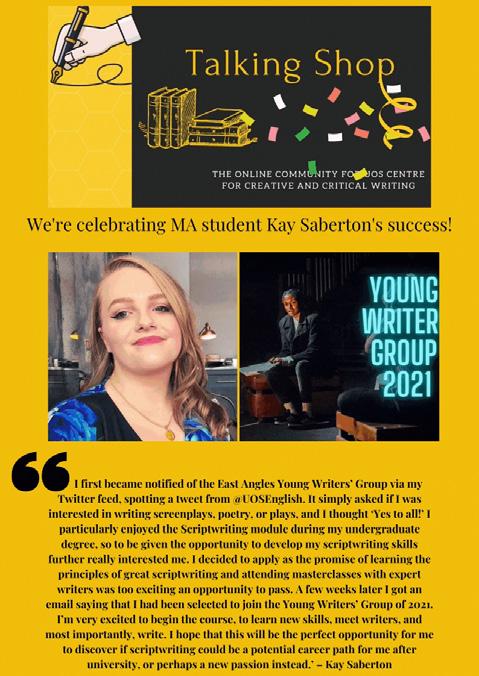
Kay says, “I saw the Eastern Angles Young Writers Group via my Twitter feed, spotting a tweet from @UOSEnglish. I loved the Scriptwriting module during my English undergraduate degree, and now that I have embarked on the MA in Creative and Critical Writing I am developing this love of scriptwriting further. The opportunity to work with a theatre group sounded amazing.
“I applied for a place with the Eastern Angles Young Writers Group and then a few weeks later, I got an email saying that I had been selected to join them! I’m very excited to attend their masterclasses, to work with professionals, meet writers, and most importantly, write. I hope this will be the perfect opportunity for me to develop my scriptwriting as a potential career path for me after university.”
Adding to this, Jeremy Evans, also a student on the MA course, has just been longlisted for the Laxfield New Anglia Manuscript Prize. The Laxfield Literary agency represents high profile international authors and is currently running a literary competition to support and find new writing talent in East Anglia.
Jeremy said, “In December, the Laxfield Literary Agency asked for submissions from new writers especially from East Anglia. Dr Hodgkinson put the details on the Talking Shop site and encouraged us to enter the competition. I sent in my novel Dubois of the Milice. It’s still at an early stage of development but I am excited, proud and amazed to say that the book has been long listed by the judges. It is one of nine books in line for the top prize £500 and agency representation.”
More information:
Laxfield Literary Associates
University of Suffolk MA Creative and Critical Writing course
Eastern Angles’ Young Writers’ Group 3.0 (the online edition)
University of Suffolk NEWS Issue 10 Spring 2020 Page 19
RESEARCH AND PUBLICATIONS
Collaborative Honour Abuse Research project report
Findings from a 2014 Freedom of Information (FOI) request by the Iranian and Kurdish Women’s Rights Organisation (IKWRO) revealed 2,823 cases of ‘honour’ based violence had been recorded by 39 police forces during 2010, and that only 20% of police forces were flagging ‘honour’ based abuse and violence (HBV/A). The findings provided the catalyst for the research report ‘Honour’ abuse, violence, and forced marriage in the UK. Police reports (incidents and charges) and specialised training: 2018 and 2019.
Since the report was published, a multi disciplinary research team made up of academics, a specialist victim led service, and a national training provider worked together to provide new information on the prevalence of HBA/V and forced marriage (FM) recorded by the police, and the scope of frontline staff training received around HBA/V and FM related crimes.
Dr Olumide Adisa, University of Suffolk, said “Our findings demonstrate there is a need for educating officers to better identify and record HBV/A crimes/incidents. Issues remain with inconsistent data collection and recording between forces, which continue to undermine efforts to gain a national picture of so called ‘honour’ based violence.”
The research team comprised of Dr Adisa and Dr Katherine Allen from the Centre for Abuse Research at the University of Suffolk, Dr Roxanne Khan from HARM (Honour Abuse Research Matrix) at University of Central Lancashire, Yasmin Khan from HALO Project and Meena Kumari from H.O.P.E. Training & Consultancy. The report, including the new findings, was published on the 15th anniversary of the ‘honour’ killing of Banaz Mahmod.
View the report
Domestic abuse conference series
A series of conferences are taking place over the next couple of months, hosted by the University.
All the conferences will be looking at issues connected to domestic abuse.
Already the series has included a conference entitled ‘Collective Efficacy, Community Safety and Domestic Abuse during and after COVID-19’ which addressed what impact the pandemic has had on community responses to domestic abuse and what lessons could be learnt. It included a presentation from the Designate Domestic Abuse Commissioner for England and Wales, Nicole Jacobs.
This event was followed by a conference about Access to Justice: Stalking and the Victim’s Right to Review, which included the launch of new
research. Look out for more on this in the next issue of the Newsletter.
Dr Olumide Adisa, Head of the Centre for Abuse Research, said, ”Our conferences and events on domestic abuse have always been about furthering our knowledge on ‘what works’ as well as uncovering new and under researched areas that are vital in our understanding of tackling domestic abuse. Through these virtual sessions, we hope to inspire and challenge everyone that attends to see themselves as catalysts for change in naming domestic abuse in everyday spaces and collectively taking responsibility for ending this devastating crime.”
Find out more about the free virtual conferences which continue until 25 May
Issue 10 Spring 2021 University of Suffolk NEWS Page 20
LAUNCHING AN INTEGRATED CARE ACADEMYLATEST NEWS
Calling all health and social care workers, students, researchers, volunteers, carers and local community groups!
If you have a passion for better joined up care, come and share your exciting ideas during our “Foundation Week”, 24–28 May 2021.
The line up of events during Foundation Week will offer a choice of creative ways to promote and celebrate integrated care.
Foundation Week offers a programme of online activities to mark the foundation of the new Integrated Care Academy (ICA). This will include a choice of taster training sessions, research showcases, technology demos, inspirations for great leadership and creative sessions to show off the talents of Suffolk and north east Essex
We will publish the full programme of Foundation Week events on the Eventbrite website towards the end of April. Email nicole.smith@westsuffolkccg.nhs.uk to register your interest..
Focus groups:
7 April, 2.00–4.00pm: End of life care
8 April, 10.00am–12 noon: Care for older people
15 April, 10.00am–12 noon: Mental health
If you would like to join an online focus group, please email our ICA Programme Office: nicole.smith@westsuffolkccg.nhs.uk
OVER TO YOU
We want this newsletter to be a reflection of all of the excellent projects, research and work being undertaken by our staff. If you have any feedback and suggestions for content please get in touch by emailing Atlanta Blair at atlanta.blair@uos.ac.uk Thank you.
University of Suffolk NEWS Issue 10 Spring 2020 Page 21









 Professor Helen Langton Vice‑Chancellor and CEO
Professor Helen Langton Vice‑Chancellor and CEO

































